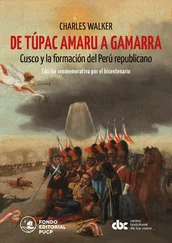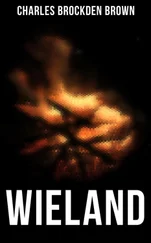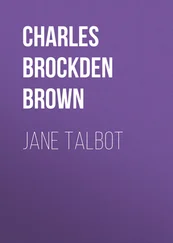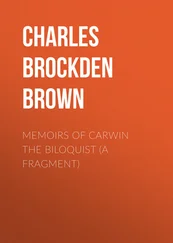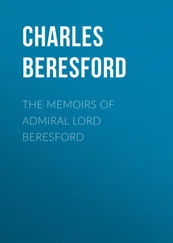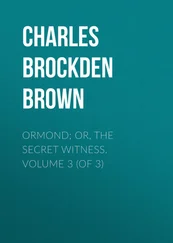Charles Brown - Edgar Huntly; or, Memoirs of a Sleep-Walker
Здесь есть возможность читать онлайн «Charles Brown - Edgar Huntly; or, Memoirs of a Sleep-Walker» — ознакомительный отрывок электронной книги совершенно бесплатно, а после прочтения отрывка купить полную версию. В некоторых случаях можно слушать аудио, скачать через торрент в формате fb2 и присутствует краткое содержание. Жанр: foreign_prose, foreign_antique, на английском языке. Описание произведения, (предисловие) а так же отзывы посетителей доступны на портале библиотеки ЛибКат.
- Название:Edgar Huntly; or, Memoirs of a Sleep-Walker
- Автор:
- Жанр:
- Год:неизвестен
- ISBN:нет данных
- Рейтинг книги:4 / 5. Голосов: 1
-
Избранное:Добавить в избранное
- Отзывы:
-
Ваша оценка:
- 80
- 1
- 2
- 3
- 4
- 5
Edgar Huntly; or, Memoirs of a Sleep-Walker: краткое содержание, описание и аннотация
Предлагаем к чтению аннотацию, описание, краткое содержание или предисловие (зависит от того, что написал сам автор книги «Edgar Huntly; or, Memoirs of a Sleep-Walker»). Если вы не нашли необходимую информацию о книге — напишите в комментариях, мы постараемся отыскать её.
Edgar Huntly; or, Memoirs of a Sleep-Walker — читать онлайн ознакомительный отрывок
Ниже представлен текст книги, разбитый по страницам. Система сохранения места последней прочитанной страницы, позволяет с удобством читать онлайн бесплатно книгу «Edgar Huntly; or, Memoirs of a Sleep-Walker», без необходимости каждый раз заново искать на чём Вы остановились. Поставьте закладку, и сможете в любой момент перейти на страницу, на которой закончили чтение.
Интервал:
Закладка:
My eye followed him as long as he was visible, but my feet were rooted to the spot. My musing was rapid and incongruous. It could not fail to terminate in one conjecture, that this person was asleep . Such instances were not unknown to me, through the medium of conversation and books. Never, indeed, had it fallen under my own observation till now, and now it was conspicuous, and environed with all that could give edge to suspicion and vigour to inquiry. To stand here was no longer of use, and I turned my steps towards my uncle's habitation.
Chapter II
I had food enough for the longest contemplation. My steps partook, as usual, of the vehemence of my thoughts, and I reached my uncle's gate before I believed myself to have lost sight of the elm. I looked up and discovered the well-known habitation. I could not endure that my reflections should so speedily be interrupted. I therefore passed the gate, and stopped not till I had reached a neighbouring summit, crowned with chestnut-oaks and poplars.
Here I more deliberately reviewed the incidents that had just occurred. The inference was just, that the man, half clothed and digging, was a sleeper; but what was the cause of this morbid activity? What was the mournful vision that dissolved him in tears, and extorted from him tokens of inconsolable distress? What did he seek, or what endeavour to conceal, in this fatal spot? The incapacity of sound sleep denotes a mind sorely wounded. It is thus that atrocious criminals denote the possession of some dreadful secret. The thoughts, which considerations of safety enable them to suppress or disguise during wakefulness, operate without impediment, and exhibit their genuine effects, when the notices of sense are partly excluded and they are shut out from a knowledge of their entire condition.
This is the perpetrator of some nefarious deed. What but the murder of Waldegrave could direct his steps hither? His employment was part of some fantastic drama in which his mind was busy. To comprehend it demands penetration into the recesses of his soul. But one thing is sure: an incoherent conception of his concern in that transaction bewitches him hither. This it is that deluges his heart with bitterness and supplies him with ever-flowing tears.
But whence comes he? He does not start from the bosom of the earth, or hide himself in airy distance. He must have a name and a terrestrial habitation. It cannot be at an immeasurable distance from the haunted elm. Inglefield's house is the nearest. This may be one of its inhabitants. I did not recognise his features, but this was owing to the dusky atmosphere and to the singularity of his garb. Inglefield has two servants, one of whom was a native of this district, simple, guileless, and incapable of any act of violence. He was, moreover, devoutly attached to his sect. He could not be the criminal.
The other was a person of a very different cast. He was an emigrant from Ireland, and had been six months in the family of my friend. He was a pattern of sobriety and gentleness. His mind was superior to his situation. His natural endowments were strong, and had enjoyed all the advantage of cultivation. His demeanour was grave, and thoughtful, and compassionate. He appeared not untinctured with religion; but his devotion, though unostentatious, was of a melancholy tenor.
There was nothing in the first view of his character calculated to engender suspicion. The neighbourhood was populous. But, as I conned over the catalogue, I perceived that the only foreigner among us was Clithero. Our scheme was, for the most part, a patriarchal one. Each farmer was surrounded by his sons and kinsmen. This was an exception to the rule. Clithero was a stranger, whose adventures and character, previously to his coming hither, were unknown to us. The elm was surrounded by his master's domains. An actor there must be, and no one was equally questionable.
The more I revolved the pensive and reserved deportment of this man, the ignorance in which we were placed respecting his former situation, his possible motives for abandoning his country and choosing a station so much below the standard of his intellectual attainments, the stronger my suspicions became. Formerly, when occupied with conjectures relative to the same topic, the image of this man did not fail to occur; but the seeming harmlessness of his ordinary conduct had raised him to a level with others, and placed him equally beyond the reach of suspicion. I did not, till now, advert to the recentness of his appearance among us, and to the obscurity that hung over his origin and past life. But now these considerations appeared so highly momentous as almost to decide the question of his guilt.
But how were these doubts to be changed into absolute certainty? Henceforth this man was to become the subject of my scrutiny. I was to gain all the knowledge, respecting him, which those with whom he lived, and were the perpetual witnesses of his actions, could impart. For this end I was to make minute inquiries, and to put seasonable interrogatories. From this conduct I promised myself an ultimate solution of my doubts.
I acquiesced in this view of things with considerable satisfaction. It seemed as if the maze was no longer inscrutable. It would be quickly discovered who were the agents and instigators of the murder of my friend.
But it suddenly occurred to me, For what purpose shall I prosecute this search? What benefit am I to reap from this discovery? How shall I demean myself when the criminal is detected? I was not insensible, at that moment, of the impulses of vengeance, but they were transient. I detested the sanguinary resolutions that I had once formed. Yet I was fearful of the effects of my hasty rage, and dreaded an encounter in consequence of which I might rush into evils which no time could repair, nor penitence expiate.
"But why," said I, "should it be impossible to arm myself with firmness? If forbearance be the dictate of wisdom, cannot it be so deeply engraven on my mind as to defy all temptation, and be proof against the most abrupt surprise? My late experience has been of use to me. It has shown me my weakness and my strength. Having found my ancient fortifications insufficient to withstand the enemy, what should I learn from thence but that it becomes me to strengthen and enlarge them?
"No caution, indeed, can hinder the experiment from being hazardous. Is it wise to undertake experiments by which nothing can be gained, and much may be lost? Curiosity is vicious, if undisciplined by reason, and inconducive to benefit."
I was not, however, to be diverted from my purpose. Curiosity, like virtue, is its own reward. Knowledge is of value for its own sake, and pleasure is annexed to the acquisition, without regard to any thing beyond. It is precious even when disconnected with moral inducements and heartfelt sympathies; but the knowledge which I sought by its union with these was calculated to excite the most complex and fiery sentiments in my bosom.
Hours were employed in revolving these thoughts. At length I began to be sensible of fatigue, and, returning home, explored the way to my chamber without molesting the repose of the family. You know that our doors are always unfastened, and are accessible at all hours of the night.
My slumbers were imperfect, and I rejoiced when the morning light permitted me to resume my meditations. The day glided away, I scarcely know how, and, as I had rejoiced at the return of morning, I now hailed, with pleasure, the approach of night.
My uncle and sisters having retired, I betook myself, instead of following their example, to the Chestnut-hill . Concealed among its rocks, or gazing at the prospect which stretched so far and so wide around it, my fancy has always been accustomed to derive its highest enjoyment from this spot. I found myself again at leisure to recall the scene which I had witnessed during the last night, to imagine its connection with the fate of Waldegrave, and to plan the means of discovering the secret that was hidden under these appearances.
Читать дальшеИнтервал:
Закладка:
Похожие книги на «Edgar Huntly; or, Memoirs of a Sleep-Walker»
Представляем Вашему вниманию похожие книги на «Edgar Huntly; or, Memoirs of a Sleep-Walker» списком для выбора. Мы отобрали схожую по названию и смыслу литературу в надежде предоставить читателям больше вариантов отыскать новые, интересные, ещё непрочитанные произведения.
Обсуждение, отзывы о книге «Edgar Huntly; or, Memoirs of a Sleep-Walker» и просто собственные мнения читателей. Оставьте ваши комментарии, напишите, что Вы думаете о произведении, его смысле или главных героях. Укажите что конкретно понравилось, а что нет, и почему Вы так считаете.



